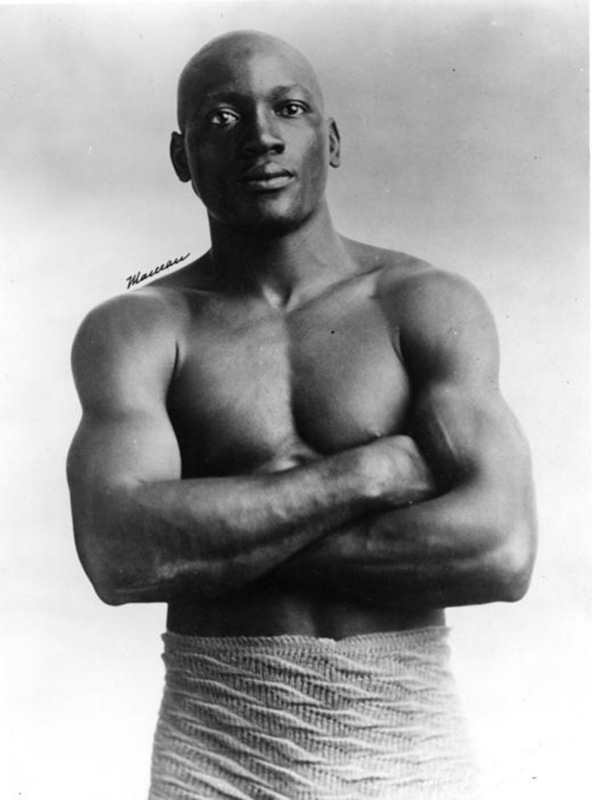Jack Johnson, The Man
100 years ago today, on July 4th, 1910, Jack Johnson defeated hope. That day, hope was represented by boxer James J. Jeffries, who had retired 6 years earlier as boxing’s World Heavyweight Champion. Jeffries came out of retirement for the sole purpose of beating beat Jack Johnson, the first Black man to be World Heavyweight Champion. Jeffries’ mission on Independence Day 1910 was to restore the World Heavyweight Championship to its rightful owners- the White Man.
Johnson ascended to the World Heavyweight Champion throne by dismantling Tommy Burns on December 26th, 1908 in Sydney, Australia. Till then, White people believed that Black men were too weak, too cowardly, too lazy, too stupid, too limited as men to be World Heavyweight Champion. After chasing Heavyweight Champion Tommy Burns around the world for 2 years, Johnson knocked out Burns in 14 rounds and became the first Black World Heavyweight Champion. White people derided Johnson’s victory, claiming that Johnson was not the Champion because he had never fought James J. Jeffries, who had retired undefeated. White people called on Jeffries now to unretire and vanquish Johnson.
In 1910, Jeffries heeded the call and agreed to face Johnson. Said Jeffries, “I feel obligated to the sporting public at least to make an effort to reclaim the heavyweight championship for the white race. . . . I should step into the ring again and demonstrate that a white man is king of them all.” Jeffries accepted the “Great White Hope” mantle.
The “Fight of the Century” took place on July 4th, 1910 in front of 20,000 spectators, mostly White, in a ring constructed just for the occasion in Reno, Nevada. Many more followed the fight over the radio. The fight was a one-sided affair. Johnson was too fast, too strong, too skilled for Jeffries. Johnson was a cerebral fighter who started fights sizing up opponents while avoiding their blows. Johnson capitalized on his opponent’s mistakes and as the rounds tolled, Johnson became more aggressive. Johnson knocked Jeffries down for the first time in Jeffries’ career in the 15th round. Jeffries’ corner threw in the towel to prevent Johnson from knocking Jeffries out. By destroying the “Great White Hope”, Johnson had struck a blow to racist stereotypes of Black inferiority and had given the world a glimpse into a future where given the opportunities, Black Americans could and would excel.
Following Johnson’s victory over Jeffries, Blacks around the U.S. took to the streets to celebrate Johnson’s glorious victory. In some cities, the police allowed the revelers to celebrate unmolested. In other cities, police and angry White people tried to quash the celebrations in a desperate attempt to preserve the White people’s place at the top of the U.S.’s racial hierarchy. In all, riots occurred in more than 25 states. About 23 Blacks and 2 Whites were killed and hundreds more were injured.
The consequences of Johnson’s victory were far reaching. In an effort to eradicate evidence of Johnson’s achievement, Congress passed legislation banning the distribution of fight films across state lines.
On July 5th, 1910, the day after Johnson’s victory, the following editorial appeared in the Los Angeles Times:
A word to the black man
Do not point your nose too high
Do not swell your chest too much
Do not boast too loudly
Do not be puffed up
Let not your ambition be inordinate
Or take a wrong direction
Remember you have done nothing at all
You are just the same member of society you were last week
You are on no higher plane
Deserve no new consideration
And will get none
No man will think a bit higher of you
Because your complexion is the same
Of that of the victor at Reno
–Los Angeles times July 5, 1910
Jack Johnson lived at a time when Black Americans were treated like second class citizens, if that. Johnson lived at time when Whites used intimidation and violence to maintain the U.S.’s racial hierarchy. Johnson lived at a time when being Black was considered a sin. But Johnson wasn’t afraid. Neither was Johnson interested in being anybody’s equal. Johnson wanted to be the best. Johnson strove to be the best fighter, the best gambler, the best dressed, to drive the best cars and to sleep with the best women, Black and White; Johnson strove to be the best man. To Johnson, nobody was as qualified to evaluate what was best as he was; nobody was qualified to tell Jack Johnson how to be Jack Johnson. In an era when it was dangerous to be Black, Johnson insisted on being himself. Because Johnson insisted on being himself, he was not humble and therefore, not perfect.
Johnson was aware of mistakes and imperfections. “Just remember,” he told a reporter towards the end of his life, “whatever you write about me, that I was a man.” Like Johnson, we Americans are not perfect. Like Johnson, we Americans insist on being ourselves.
It is all together fitting that on the day that we celebrate America’s Independence, we take a moment to celebrate Jack Johnson, the man.

